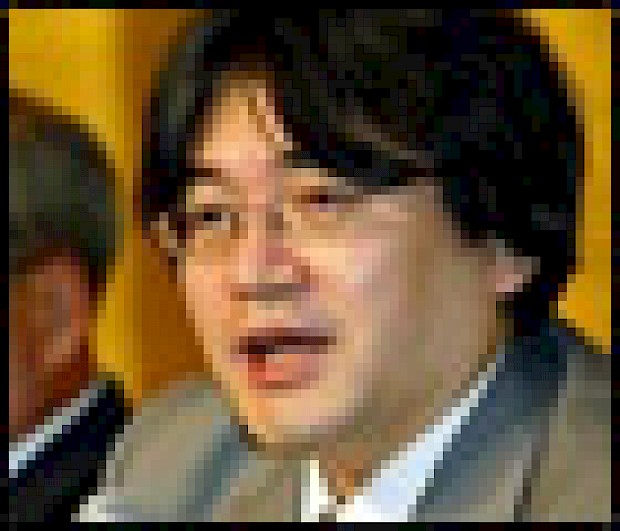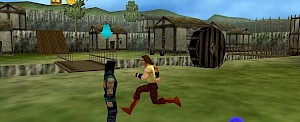News: GDC Keynote Address Roundup

Posted 23 Mar 2006 at 14:55 by Ashley Jones
We bring you everything that was discussed during Iwata's keynote address at the Game Developers Conference 2006. Zelda DS, downloadable Mega Drive games, Brain Age and much more inside!
Satoru Iwata began the speech by using an analogy, about “Company A” beating “Company B” in the 1990s and how by “thinking differently and holding strongly to your strategy can disrupt an entire industry in a good way". Apparently it was about Coca Cola, Pepsi and such, but is obviously referring to how Nintendo have changed their handheld approach with the DS due to the competition with the PSP.
Iwata then continued to speak about the Nintendo DS, Nintendogs and other recent successes for the company and how these new kinds of software are encouraging new kinds of gamers, such as the surge in female gamers with titles such as Nintendogs.
Brain Age is bound to cause some interest amongst a lot of gamers due to its unusual nature, and Iwata is more than pleased to discuss its origin and development. According to the man himself, "It came from where all great ideas come from - from our board of directors." Joking aside Iwata stated that the idea comes from the success of similar books in Japan, popular with Nintendo staff.
To test the game during development they actually used a brain scanning device to see how the brain responded to the game, even testing it on Dr. Kawashima, author of the books. After retailers and sales people questioned the title’s uniqueness they simply stated that it was not a game, but rather an interactive training program. Certainly a bold idea, and we’ll see how well it does when it is launched in Europe soon. However Bill Trinen (from Nintendo of America) seems confident that it will be a success in America.
Discussing the title Trinen explained some of the title’s features, such as the random generation of the exercises so players won’t be able to remember the pattern. Using the unique abilities of the DS players will be able to use voice and hand-writing recognition and all improvement will be shown on graphs, so you can see just how successful you are doing. Gamers in the West will also be able to look forward to a previously-announced Sudoku mode, with over 100 puzzles and hand-writing recognition.
It seems that Nintendo really wish to push this game, because, as every time they won’t to show off a big title, they have invited various members of the gaming industry to join in. Joining Trinen on stage were the director of the Game Developers Conference, Geoff Keighley (a gaming show’s host), and developer Will Wright of The Sims fame. The four competed in an arithmetic challenge, and the winner was Trinen, potentially due to his experience with the game.
At this point Iwata took over the presentation again, to further discuss Brain Age and its huge success already. After Nintendogs phenomenal success in Europe perhaps Brain Age will sell even more, perhaps even overtake overall sales of Nintendogs, but obviously we’ll have to wait and see.
A large part of their plan to increase the success of Brain Age is to let people play them, it’s a simple but effective strategy. No doubt that they will be available to play in the recently announced DS download pods that are rolling out across Europe over the coming weeks. Another good way to do this is give people a free copy of the game, which is what every member of the audience received.
Moving on Iwata commented that Nintendo are trying to take a different approach to technology. They have been slated before about their lack of online services, but as Iwata is pleased to boast, their internet service has done very well since launch due to its simple and cheap (i.e. free) service. In only eighteen weeks there were one million unique players. He also pointed out that it took Xbox Live twenty months to reach that level of players, certainly an impressive feat.
"Online gaming normally belongs to the most aggressive players, and they can be a very vocal group. This interaction can be intimidating for casual players." Iwata stated that Nintendo wished to achieve a friendly atmosphere with their Wi-Fi connection, which was initially called "Project Houseparty".
At this point Bill Trinen came back on stage to demonstrate Metroid Prime: Hunters, which as we all knows means he took the chance to play a multiplayer game with the creators of the game. Of course he took the time to also display the features of the games, such as the morph ball.
In another switch, Iwata came back onto stage and comes a big announcement; Zelda DS! The title will be called The Legend of Zelda: Phantom Hourglass. The game features Wind-Waker style graphics and comes from the same team. The bottom screen will be used for the action, and the top screen will be mostly maps. Of course the touch screen will be utilised, you will draw things which will be transferred to the bottom screen. It is due to launch later this year, but no news on if that’s Japan or worldwide.
Moving onto the Revolution (to everyone’s delight) Iwata stated that everyone asked him how the idea for the controller originated, stating that some people are afraid to touch regular controllers, finding them too daunting. He also reminded everyone that previous Nintendo titles will be playable with the controller. Noticing how people are very willing to pick up a television remote the company begin experimenting with the controller, and that’s the origin of the unusual controller.
Iwata stated that the Revolution needs to be wireless, approachable, sophisticated, and of course, “revolutionary”. It seems that the controller idea was a joint effort; with Miyamoto coming up with the attachment idea and the Metroid Prime team coming up with the nun chuck add-on.
Iwata has discussed how a huge amount of money is needed to create games these days, and Nintendo wished for something different, to give developers with great ideas a cheaper alternative. "Some people put their money on the screen; we decided to put ours on the game interface.” However, developing the controller will be expensive, but chances are like all other companies Nintendo will make huge losses on it.
"New is good, but there is also an appetite for old.” This is Nintendo’s idea between the back catalogue idea, and will be offering some old Sega Mega Drive games, and some Hudson titles too. Iwata stated that if the gaming industry was a bookstore, it would be full of encyclopaedia. Due to the increased cost of production companies are relying on sequels to earn their money back.
While future Zelda, Mario and Metroid titles are planned, and will all be masterpieces, Iwata stated that there is still a place for the old titles, and hopes the ‘Virtual Console’ will be the gaming equivalent of iTunes. Similarly they hope to be the iTunes, while others will have their own version (probably referring to Sony) Nintendo’s will be the one to beat.
Nintendo aims to innovate and reach new audiences and aims to do this by stretching the way developers and publishers work, and allow for them to express themselves in unique ways. Videogames are meant to be one thing according to Iwata, fun. With that in mind he states that everyone will be able to understand their philosophy through seeing it in action, and playing it “in a few weeks”, presumably E3.
It is at this point that Iwata ended the conference. While there was obvious disappointment that bigger things (i.e. more Revolution news) weren’t announced, there is certainly enough to keep us thinking, guessing and hoping until E3. Is it May yet?





















